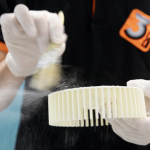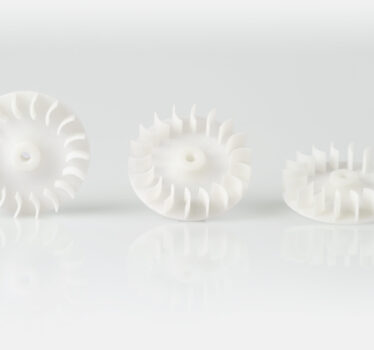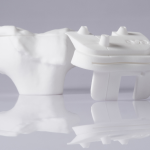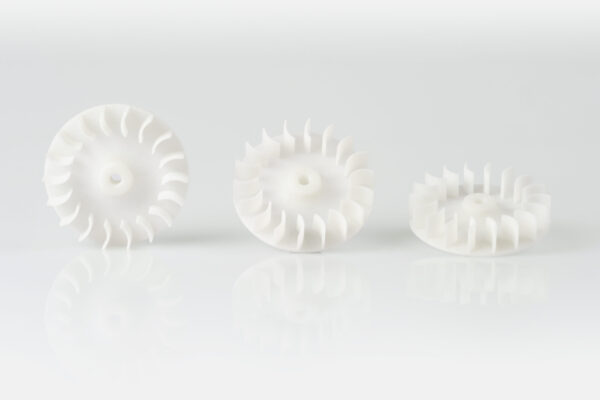Selective Laser Sintering (SLS) is a 3D printing technology in which a high-powered laser fuses small particles of polymer powder into a solid structure, based on a 3D CAD model. SLS stands out with features such as high resolution, efficient production capacity, and a wide variety of compatible materials. It is therefore ideal for numerous applications:
- Rapid Prototyping: Commonly used in industrial applications for quick prototyping and low-volume custom production.
- End-Use Functional Parts: Enables the production of complex and highly detailed components.
- Reduced Assembly Needs: Consolidates parts into single builds, offering cost advantages.
- Support-Free Printing: Eliminates the need for support structures while producing durable and detailed parts.
Thanks to this technology, hollow or internal cavities, overhangs, and intricate details that usually require support can be printed with ease. This gives designers greater creative freedom and design flexibility. Moreover, internal structures and channels can be manufactured without the need for support material. This preserves design integrity while simplifying production. The absence of support structures makes SLS especially suitable for detailed and complex parts. You can produce personalized figurines and prototypes using a 3D printer.
Material selection in the 3D printing process plays a critical role in determining the durability and application area of the printed part.
PLASTIC MATERIALS
PA2200
- A white polyamide powder known for its strength, rigidity, and chemical resistance.
- Versatile Material: Suitable for a wide range of applications.
- High Strength and Rigidity: Performs under challenging mechanical loads.
- Good Chemical Resistance: Withstands various chemical agents.
- Long-Term Stability: Maintains properties over time for consistent performance.
- High Accuracy and Detail Resolution: Ideal for fine, precise parts.
- Surface Finishing Options:
- Metal coating
- Vibratory tumbling
- Dip dyeing
- Adhesive assembly
- Powder coating
PA1101
- A tough material with high impact resistance and flexibility at break.
- Temperature Resistance: Higher than PA12
- Mechanical Stability Across Temperature Ranges
- Environmentally Friendly Option
- Applications: Ideal for industrial parts demanding high impact and heat resistance
PA3200 GF (Glass-Fiber Reinforced Polyamide)
- A composite material made of PA12 with glass fiber, offering exceptional mechanical strength.
- Material Properties:
- High durability for tough environments
- Wear resistance for parts subject to friction
- Thermal stability at high temperatures
- Application Areas:
- Automotive: Gears, covers, engine bay components
- Industrial: Fixtures, mounts, wear-resistant tools
- 3D Printing: Functional prototypes and durable end-use parts
Alumide®
- A metallic-looking polyamide material filled with aluminum particles.
- Key Features:
- Strong, stiff, and thermally stable
- Easy to post-process (sanding, coating)
- High heat resistance ensures dimensional stability
- Ideal for:
- Functional parts exposed to high temperatures
- Aesthetic components with metallic finishes
PrimeCast® 101
- A polystyrene-based gray powder specifically designed for investment casting.
- Advantages:
- Excellent dimensional accuracy
- Low melting point
- Perfect for precision casting applications






